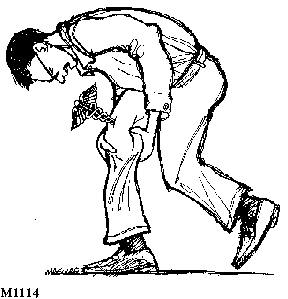
Essay and drawing copyright 1997 by Barrie Maguire

Anecdotal evidence is considered worthless research, but when the anecdotes come from people close to you, they're a heck of a lot more real than any poll on the evening news. Here are two examples.
A month ago "Eric" tripped on a curb while running for a bus, went sprawling in the gutter and found himself barely able to walk. Because he is young and is a "contract worker" (read: no benefits) for a large company, he has no health insurance. After hobbling around in pain for a few days a friend told him of a clinic at a local hospital where they would diagnose injuries without charge for people who had no insurance. The next evening, he spent four hours there, and after a lengthy interrogation that followed his answer of "None" to the health insurance question on the admissions paperwork, his foot was x-rayed, wrapped, braced, and he was told that if it didn't get better in a few days to go see a doctor. So far he has received two bills, one from the emergency room and another from the x-ray department totalling $563.50.
"David" also made a big mistake. He got himself mugged, his left arm severely wrenched in the process. Because he was young, a struggling artist barely able to support himself, he has no health insurance. A doctor's care was out of the question. He decided to let nature take its course. After a couple of months, his arm stopped aching. A year later it still hasn't regained full mobility.
My anecdotal research tells me that the American people are making a big mistake, a mistake that is costing a lot of us a heck of a lot of grief and worry. I'm talking about the "smaller government" crusade. Certain taxpayers decided that the problem with America was that the Federal Government was doing too darn much for the American people. Giving them too many x-rays, too many doctor visits, not to mention hiring too many people and feeding too many families.
The health care example is the most glaring. When President Clinton proposed giving health care to everyone (yes, even young people and part-time workers) the plan was sabotaged by an alliance of health-care profiteers and fully-covered congressmen. A zillion dollars was spent on television scare ads and the Clinton health care plan was left in disgrace. As the victors sighed in relief that their taxes wouldn't be raised, the working poor groaned in disappointment.
The irony is that a couple of years later, the same health- care profiteers have produced the same gloomy results they predicted for the Government plan: reduced care, reduced choice, etc. Of course, there is one big difference, the working poor still have no coverage.
Ask the working poor about smaller government. Ask them if they want to get government off their backs, ask the Erics and Davids for whom a doctor visit is a financial crisis, for whom a hospital stay costs half a year's income. To them, Big Government means help from above.
But don't try to sell that to the over-taxed folks in the upper-income brackets. They can't keep enough of their money as it is, so they won't permit the passing down of anymore of their hard-earned cash. Instead, for people like Eric or David, they're passing down bootstraps.
***